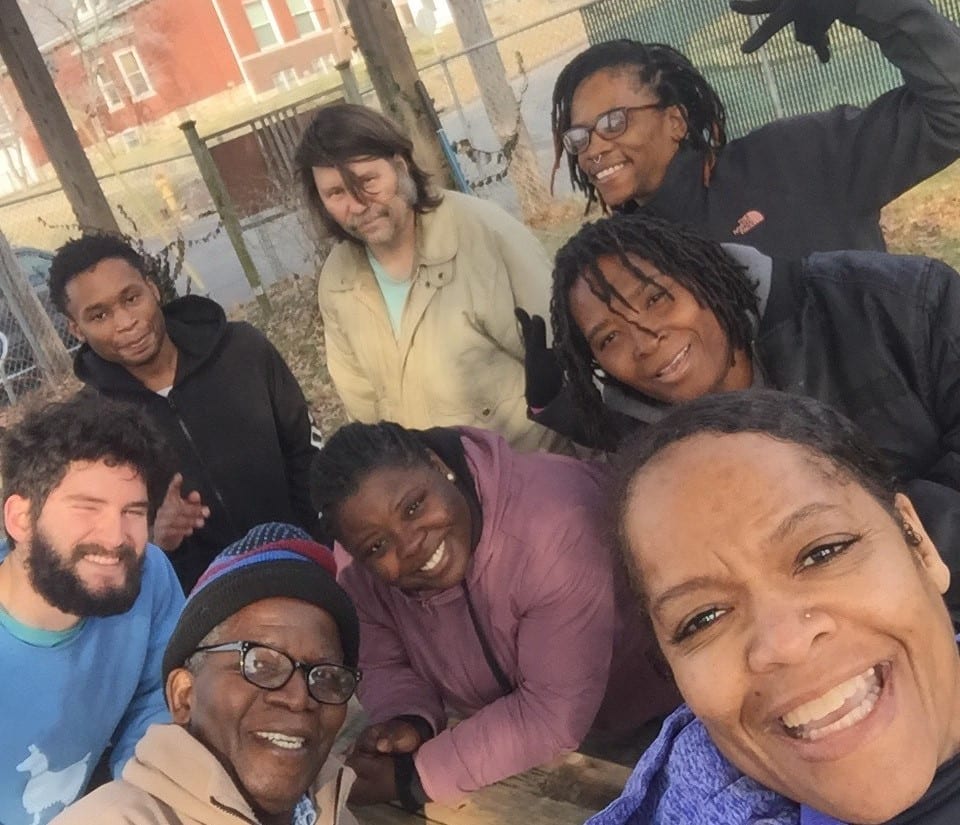Noah Offenkrantz is a junior majoring in Global Health and the Environment. Enrolling in the Environmental Studies community internship program last fall, he had the chance to work directly with the Restorative Justice Movement Center (RJMC) on the creation of a garden for the Center’s community. The RJMC is a non-profit organization in North St. Louis that hosts community building events and rehabilitation meetings. Among other services, the Center holds daily Narcotics Anonymous meetings, providing a forum for recovering addicts to seek solace in the collective nature of their battle. Noah recounts his rewarding internship experience with the Restorative Justice Movement Center.
This semester I had the privilege of working with the Restorative Justice Movement Center (RJMC) to start a community garden with the help and partnership of Gateway Greening, a local organization that provides grants to fund the development of gardening projects. In order to earn the funding, Gateway Greening requires that its funding recipients complete four stages of project planning. This semester, the Center’s founders Amber and DeAndre Harris and I invested our time and research into the third stage of this process, developing a multi-year project design and project budget that aligned with the Center’s vision for the garden. We met with Carolyn Cosgrove-Payne, a former employee of Gateway Greening and the current Community Engagement Coordinator for the Environmental Studies Program at WashU, to finalize our project plans. After meeting with Carolyn and completing 15 hours of volunteer time at a local community garden, we organized one final meeting with Jackson Hambrick, our point person at Gateway Greening, to get stage 3 approved. According to Hambrick, everything checked out and the Restorative Justice Movement Center is ready for stage 4! Stage 4 involves the actual construction of the community garden. Thus, we intend to coordinate a material drop-off day in the beginning of the spring when community members can gather at the garden site to transform ambitions into reality. Before then, the RJMC must secure Land Reutilization Authority (LRA) insurance for the property. This process is already underway.
Besides lending my effort to the Garden operation, I had a hand in a few other projects. While working through the Gateway Greening’s stages, I realized the Center’s need for outside funding. For this reason, I assembled a package of promotional materials to assist in the procurement of philanthropic donations. In this package, I included a lengthy letter explaining the RJMC’s mission, a succinct version of the same letter, a flier that describes the Center’s future ambitions, and a 4-minute video meant to highlight the Center’s role in the community. To assemble this video, I interviewed twelve people who have either furthered the Center’s capacity to create change or benefited from the Center’s services. These interviews accumulated into 2 hours of heart-touching footage. A common theme of this footage is the Center’s role as a beacon of hope in the Ville neighborhood.
Not only did Amber and I assemble an assortment of promotional materials that will attract donations in the future, but also we benefited from the philanthropic donations of a Washington University organization during my tenure. Specifically, Kappa Sigma fraternity donated over $1500 dollars to the Restorative Justice Movement Center. The fraternity raised this money by hosting a No-shave November event in which members of the organization auctioned off the ability to style their facial hair. Regarding this fundraising event, Harrison Rohrbach, the Philanthropy chairman of Kappa Sigma Fraternity, commented, “It’s refreshing to see such a strong group effort from the Kappa Sigma brotherhood when it came to raising money for the Restorative Justice Movement Center.” A portion of the money raised will be used to organize a “RJMC Community Appreciation” event this coming semester. The Kappa Sigma community intends to participate in this celebration, cooking and serving food with the North St. Louis population.
I am so grateful for my experience at the RJMC. From the brief tenure that I spent at the Center, I gained a life time of perspective. I was touched by the unwavering perseverance and selfless sacrifice of Amber Harris, the Center’s co-founder. I was awed by humans who re-wrote their life stories, overcoming unfortunate circumstances to pioneer community movements. Deep in the heart of North St. Louis, I found much more than a collection of narratives. I encountered a community. I am forever grateful to this community for welcoming me with open arms. I can’t wait to see how the community blossoms moving forward and am especially excited to watch the community garden aid this transformation.
